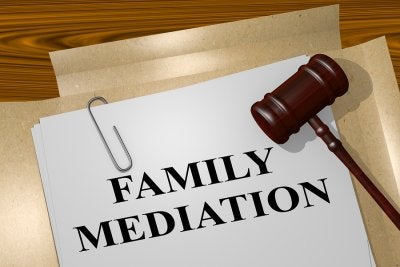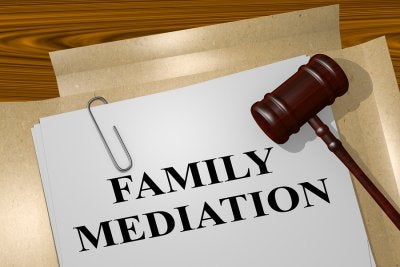-
Separate Revocable Trusts

When you have children and have been through a divorce, it’s natural to be apprehensive about your kids’ future if you decide to marry again. A second marriage often requires much more planning than just a wedding when children are involved. This is especially true if you have assets you want to pass along to your children when you pass away.
If you were to pass away first and didn’t implement a plan, your children could unintentionally get disinherited. A trust may be a solution to ensure your share goes to your children from your first marriage.
What is a Revocable Living Trust?
A living trust, also called a revocable trust, is an account that holds the assets and funds you place in it throughout your lifetime. You can put your home, car, and other assets in the trust’s name.
While alive, you can add, remove or make changes to the trust as often as you like. Once you pass away, the trust becomes irrevocable, and no changes can be made. The designated trustee will then distribute the trust assets and funds per your instructions.
Should We Create a Joint Trust or Separate Revocable Trust?
If you and your second spouse want everything equal, a joint trust may be the right option. But if you want your children to receive your assets or you and your spouse have different ideas for allocation, two separate trusts are advisable. It’s also the best solution if you plan to keep your finances separate. If you have assets and property separately going into the marriage, you may wish to keep them in your family.
There are other benefits to having separate spouse trusts. If your spouse is in financial trouble and has creditors coming after them, having a separate trust can shield your assets from creditor access. In a joint trust, everything is up for grabs to pay for a debt if a creditor comes knocking.
Suppose you or your spouse expect to receive an individual inheritance you’d like to keep separate. In that case, a separate trust is the best choice. A joint trust makes the inheritance equally available to your spouse.
Perhaps the most practical reason to create a separate trust is for tax savings. Maryland has an estate and inheritance tax, often referred to as a death tax. Your heirs may have to pay estate and inheritance tax if your net worth exceeds Maryland’s exemption amount. However, separate spousal trusts allow you to double the tax exemption amount, which could reduce or even eliminate the amount of taxes they owe.
Ready to Set Up Your Separate Spouse Trusts?
Having children from a prior marriage can make finances tricky. If you think two separate spouse trusts are the way to go, are leaning towards a joint trust, or aren’t sure which is the best choice for your situation, contact Mummert Law to schedule a consultation. We can help you figure out which trust solution is best for your family and set them up correctly so there’s no chance of a dispute later.
-
Prenups and The Second Marriage
 Like the song says, “Love is Lovelier the Second Time Around.” But entering a second marriage is a bit more complicated than marrying young for the first time. Chances are, your life circumstances have changed quite a bit. Your financial position has most likely improved. In fact, you may have reached retirement age. You may have children from your first marriage. Let’s look at some of the concerns that you might need to address as you remarry.
Like the song says, “Love is Lovelier the Second Time Around.” But entering a second marriage is a bit more complicated than marrying young for the first time. Chances are, your life circumstances have changed quite a bit. Your financial position has most likely improved. In fact, you may have reached retirement age. You may have children from your first marriage. Let’s look at some of the concerns that you might need to address as you remarry.Separate Property and Marital Property
As you begin your second marriage, both spouses are likely to bring money and material goods to the home. Traditionally, separate property has meant property and assets earned or accumulated by individuals before the marriage. Marital property is that which is acquired jointly or earned throughout the second marriage. This can get confusing when a divorce occurs. A prenup will do a great job of defining the two types of property. It can also describe specific items as separate or marital.
Purchasing of Joint Property
One of the advantages of being married is being able to purchase property as Tenants by the Entireties, which can protect the property against individual spouse’s creditors. It also allows that property to pass automatically to the other spouse upon the first spouse’s passing. But on second marriages, it becomes complicated. That property is being acquired with assets most likely before the marriage (sale of house or liquidation of investment accounts). A prenup helps define whether those monies are gifts to the marriage or remain traceable back to the original spouse who contributed those funds. A prenup also can set the expectation of who is paying for the house and what happens to that equity from those payments.
Supporting Your Spouse After Retirement and in Old Age
Making retirement and old age provisions becomes more important in a second marriage when husband and wife are older. Deciding ahead of time what the provisions for your spouse will be can save additional heartache and provide a clear understanding if the marriage should fail. It also gives the spouse protection should the higher-earning spouse die while the marriage is intact.
Providing for Children of the First Marriage
One thing a prenup can specify is a requirement for estate planning once the marriage has taken place. Your prenup ensures that assets can be divided between children from a previous marriage and the current spouse according to everyone’s agreement upon the death of a spouse. It’s possible through estate planning to establish trusts that will support a spouse, and leave an inheritance to the children.
If the Marriage Fails
Most people enter into a marriage with the expectation of staying in that marriage. However, nobody knows better than a previously divorced person that things don’t always work out. Having a prenup in place can help make a divorce go peacefully and amicably, with a clear understanding of how assets will be divided. Spouses can agree to have a divorce mediated, instead of fighting it out in court with two lawyers.
The Upside and Downside of Second Marriage Prenups
A discussion of second marriage prenups wouldn’t be complete without talking about how that conversation may go. Forming a prenup involves an open and honest discussion around assets, obligations, and expectations. This conversation is not always comfortable. We often avoid it because of the fear of how the other partner will take it. Partners are concerned that it could lead to disappointment and worry that it could damage the relationship.
But the upside of that conversation is having that difficult conversation; you set your marriage up for success. Having that vulnerable conversation allows both spouses to express their opinions and feelings and know the other spouse values them as a partner. Occasionally, the discussion may lead to calling off the marriage. It’s hard to say whether this is the best thing in the long run. But, the process of drawing up a prenup ensures that both parties go into the marriage with the proper expectations.
When You Need Help
At Mummert Law, this is an area in which we specialize. We support peaceful marriages. In the event it doesn’t work out, we support peaceful divorces. If you would like help drawing up a prenup for your second marriage, turn to Mummert Law for help. Call us today, and let’s set up an appointment to discuss your concerns and priorities.
-
Senior Prenups – Love in the Golden Years

What a joy it is to discover love again in our golden years. Having the companionship of a partner can help to keep a person feeling younger and vital. Often they meet with disappointment from their adult children, which causes tension in what should be happy times.
This is just one of the reasons that seniors agree on prenups before they marry. Let’s take a look at a few other reasons why a senior prenup might be a good idea.Asset Accumulation
By the time a person reaches retirement age, their financial picture will look significantly different from their twenties or thirties. There might not have been much to worry about in their younger days. As a person’s portfolio grows, so may the concerns about passing that wealth on to children and grandchildren.
You may own a home, your retirement account, and even a business in addition to other assets. These decisions are much easier to discuss before a marriage occurs, as long as you move gently and consider each other’s feelings.Balancing Your Legacy
Every circumstance is different, but the balance between providing for your spouse, if necessary, and leaving an inheritance for your heirs is important to most seniors entering a marriage. Balancing these priorities to provide for both should bring peace and harmony into the new blended family.
Negotiating the Day-to-Day Expenses
With the possibility of each partner bringing assets to the marriage, one of the issues that the couple might want to include in a senior prenup is how the couple will support the household and living expenses.
They may decide to support the household expenses equally or according to the assets that each has. If one partner has significantly fewer assets, it may not make sense for them to participate in the household expenses to any significant extent.What About Divorce?
Nobody enters a marriage thinking about divorce, but divorce can become a reality in any marriage. A prenup can clarify a variety of decisions that a couple must make when deciding to dissolve their marriage. This is especially helpful, as some couples have already been through a horrible experience with a previous divorce.
Although a prenup may address the division of assets, it can also recommend that couples use an alternative dispute resolution (ADR) to settle disputes. These methods include mediation, collaborative law, or arbitration. Using these methods can prevent the couple from ending up in court. They won’t have to pay expensive divorce lawyers and fight it out in court.
Do You Need Help With a Senior Prenup?At Mummert Law, we help couples with their prenups. We also serve as mediators, both court-appointed and private. This is beneficial since we have seen the outcomes that give us additional insight into factors that need to be considered in a prenup.
If you need help drawing up a prenup with your spouse, please contact us at Mummert Law. Although love is lovelier the second time around, both spouses should still enter the union clear-eyed and understanding their position. We will be happy to consult with one or both of you and help negotiate the best terms for your new marriage. -
Consensual Adoption

Consensual adoption usually represents a happy day and the best of circumstances. When a stepparent who has been raising a child gets to adopt that child and become their parent, officially and legally, the whole family has cause for celebration.
Steps to Consensual Adoption
First, the prospective parent files a Petition for Adoption. What happens next depends on consent. Consent means the biological parent has agreed to give up their parental rights and allow the proposed adoption to go forward. If there is no consent attached to the petition, the court issues a Show Cause Order. It is sent to the parent who is being asked to grant consent.
After being served, the parent who has been issued the Show Cause Order has thirty days to respond to that order. This is one of those situations in law where time is of the essence, and there is no wiggle room for procrastinators. In the absence of a response within 30 days, it is considered to mean consent is given. If you are planning to withhold consent, it is vital to reply and to make sure your reply reaches the court within the thirty-day window.Open vs. Closed Adoption
In a closed adoption, the biological parent no longer has parental rights. They may have been given up voluntarily or taken from them as a result of a “fitness” test. They do not have visitation rights nor the right to have any say in the rearing of the child.
In an open adoption, the biological parent may be granted limited access to the child going forward, as agreed by the two parties. Both parties will agree on when and under what conditions the parent has access to information about the child as he or she grows up, may visit the child, or have the ability to contact them.The Role of Mediation in Consensual Adoption
You may be wondering why you need an attorney or mediator if everything is agreed upon. The truth is, when it comes to matters of family law, such as adoption, it’s essential to have a legal and binding agreement. It’s also important to have a professional who is aware of all the issues involved in an adoption, whether it’s an open or closed adoption.
Put simply, people tend to change their minds over time. What they agree to today, they may challenge in the future. Having legal rights in this situation will prevent confusion in the future.
Things are different today than they were in the past. Through genetic family tracing, people are finding out as adults that the people he/she through were their parents are not actually their parents. Furthermore, parents who gave up all rights to children when they are young are having a person show up in their inbox or on their doorstep, asking if they are their biological parents.A mediator has the experience to know all the issues which can help create a durable plan for what happens in the future. A mediator can help both the adoptive parents to begin addressing these issues now, including suggestions of when the child may need counseling to address the age-old question of “Who am I?”
Why I’m Your Best Choice for a Mediator in Your Adoption Case
I’m a trained mediator, an attorney for children, and an attorney for parents. I’ve seen too many adversarial scenarios and the effect it has on the kids. Adoption through mediation is peaceful and best for everyone, from the individual to the whole family. Rely on my experience and care to guide you through the process with a minimum of drama and the best possible outcome.
-
What Is the Role of Children During the Custody Mediation Process?
Mediation is an effective alternative to court. During mediation sessions in Baltimore, a neutral third party helps parties who are at odds with each other explore the issues and discover mutually agreeable solutions. Mediation is useful for many situations, including family law matters such as child custody disputes. Even when parents have experienced significant breakdowns in communication, they may decide to attempt custody mediation in order to make the arrangements themselves, rather than entrust the custody decisions to a judge.

Children may have a limited role in custody mediation.
In most cases, children are not involved in settling custody disputes. Family law judges do not generally want to see minor children in the courtroom because of the significant stress this can inflict and the potential damage to family relationships. The same is true of custody mediation sessions. One of the goals of settling custody disputes is to avoid putting children in the middle; they should never feel as though they must choose one parent over the other. That being said, there may be some situations in which children can play a very limited role in custody mediation, provided that neither of the parents attempts to influence the children.
Children can aid in the identification of challenges.
Although children may not participate in the actual mediation sessions with all three parties, the mediator may decide to meet with the children separately to hold a low-stress discussion of the family situation. The mediator must be careful not to create a psychologically difficult situation for the children. Instead of asking a question such as, “Which parent would you rather live with?” the mediator might ask, “Who usually helps you with your homework?” The mediator might also prompt the children to identify challenges that may be settled during the mediation sessions. For example, a child might express concern about being able to participate in sports or other after-school activities despite the visitation schedule. The mediator can then bring these challenges into the mediation sessions and guide the parents in working toward solutions.
-
Tips for Talking to Your Family About Advanced Medical Directives
It may not be pleasant to think about what might happen to you if you become incapable of expressing your care preferences , but it is necessary to prevent interpersonal conflicts among family members. The document in which you can specify your healthcare preferences is called an advanced medical directive or a living will. Consider talking to an estate planning attorney in Baltimore about creating your advanced medical directive before speaking with your family about it.
When you are ready to discuss your living will with your family, watch this interview with a physician to get some helpful tips. He recommends that you first reassure your loved ones that you are not seriously ill, depressed, or otherwise experiencing trouble. This physician also discusses what adult children might consider when broaching this subject with their aging parents and he explains the types of decisions that a living will can encompass.
-
Signs of Potential Conflict in Estate Settlements
It’s often assumed that a last will and testament will be followed to the letter, regardless of the personal preferences of the surviving family members. But in fact, will disputes are not as uncommon as you might think. If you suspect you are about to become involved in a will dispute, you should consult an estate planning lawyer in Baltimore without delay. Certain situations may be more likely to lead to a challenge of the will than others.

Multiple Marriages
Divorce and remarriage can be contentious situations after death as well as during life, particularly if the first marriage produced children. Sometimes, it is discovered that the decedent left the entire estate to the last spouse that he or she married. In turn, the inheriting spouse may leave the assets to his or her surviving children. The children from the previous marriage may become disgruntled that they were not named as beneficiaries in the will. These children may decide to contest the will, perhaps by claiming that the spouse from the second marriage coerced the decedent into signing a new will.
Disinherited Children
Deciding whether or not to leave children an inheritance can be a highly sensitive choice. It is the right of the testator to decide exactly how his or her assets will be distributed. In some cases, individuals prefer to give their entire estate to charities, rather than to family. While this is certainly a legally allowed decision, the children or other family members who are disinherited may raise objections to it. Testators may try to avert future will disputes by writing a letter that explains his or her choices.
Disparate Inheritances
A similar situation is when one of the beneficiaries receives a significantly larger inheritance than the others. Sometimes, a testator will decide to leave a larger portion of the estate to an adult child who served as a primary caretaker of the testator. In other cases, the testator may leave a larger inheritance to the family member who is most likely to be financially responsible. Again, this is a legal right of the testator, but it may lead to future conflicts.
-
What Documents Should You Bring to Marital Asset Mediation?
Mediation services available in Baltimore can help you and your spouse avoid the expense and hassle of a lengthy trial. With the help of a neutral mediation lawyer, you and your spouse can review the marital assets and liabilities, and ideally, reach mutually agreeable decisions. To get the most out of each mediation session, you should arrive prepared with all of the necessary documents.

Account Statements
Set aside plenty of time to gather together financial documents. You will need statements of all of your accounts, including sole and joint accounts. These include statements for your checking and savings accounts, money market accounts, pension plans, Roth IRAs, and stock and bond investments. You’ll also need current balance statements for all accounts held for the children, such as CDs, money market accounts, and savings accounts. It may be necessary to hire a professional actuary to determine the present day value of certain accounts such as retirement funds.
Balance Statements
After you have gathered together account statements, it’s time to print out balance statements for all of your credit cards, mortgages, lines of credit, and home equity loans. Student loans, motor vehicle loans, personal loans, and business loans also play a role in marital asset mediation. Additionally, you’ll need to bring information on any pending civil lawsuits in which either of you or both of you are named as defendants.
Benefit Statements
If your job offers benefits, you’ll need statements for each of them. These include incentives, stock options, and golden parachute plans.
Property Appraisals
You may need to hire a professional appraiser to obtain appraisal statements for personal property. The mediator will request evidence of the current market value of all tangible assets, including motor vehicles, artwork, jewelry, antiques, and all other valuables.
Tax Returns
Bring copies of your state and federal tax returns for the past three years. Include copies of all 1099 and W-2 forms. If you or your spouse has a business, the past three years of corporate tax returns are also required. Additionally, you should expect to bring statements of your income for the past six months.
-
Divorce Mediation Explained
Resolving family law matters often involves litigation, but there may be a better solution for your case. Consider speaking with a mediation lawyer in Baltimore about divorce mediation. As you’ll learn when you watch this video, divorce mediation is a process that is facilitated by a neutral individual.
During a mediation session, the mediator guides each party in identifying the issues that need to be resolved, each party’s position on the issues, and possible solutions such as compromises. Through divorce mediation, you and your spouse may be able to agree on arrangements for property division, child custody, visitation, child support, and spousal support. Reaching agreements in mediation can help you and your spouse avoid the hassle and expense of going to trial.
-
Preparing for Post-Divorce Mediation to Modify Child Support or Custody
It’s often expected that a divorce agreement will resolve family law issues beyond a shadow of a doubt. But in fact, many disputes can arise months or years after the divorce agreement was signed. For example, one party may wish to change the custody agreement or child support arrangement. If this applies to your situation, you can consult a mediation lawyer in Baltimore . He or she may recommend post-divorce mediation. Being well prepared for your mediation sessions can help you get the most out of them.

Gather Documents
Ahead of your first mediation session, you should gather together documents that are relevant to the case. Your lawyer can provide guidance on which specific documents or evidence will be useful for achieving your goals. For example, if you wish to increase the child support payments you’re receiving, you may need evidence that demonstrates that the child’s financial needs are increasing. These might include medical bills or receipts for extracurricular activities. Perhaps you wish to modify the visitation schedule. For example, you might argue that your child’s grades are declining because of the back-and-forth visitation during the week days. Gather together your child’s report card, progress reports, notes from teachers, and similar evidence.
Prepare Proposals
You likely already have a clear idea of what you would like to accomplish in post-divorce mediation. But it can be even more helpful to put your proposal into writing. For example, you might develop one or more alternative schedules of visitation. If you want your child with you during the entire week, you’ll need to be prepared to increase visitation during other times such as school vacations, holidays, and weekends. Understand that it’s unlikely that your proposal will be accepted exactly as is. However, it can provide a good starting point for the discussion.
Adjust Your Mindset
Before going into mediation, your lawyer may counsel you to adjust your mindset. Mediation is intended to resolve conflicts in a mutually agreeable way . It’s expected that parties involved with mediation may not be on the best of terms, but entering mediation with a confrontational mindset is counterproductive. Remind yourself that you’ll have to be willing to compromise to make progress. You might even identify areas where you’re willing to compromise before your session with the mediator.

